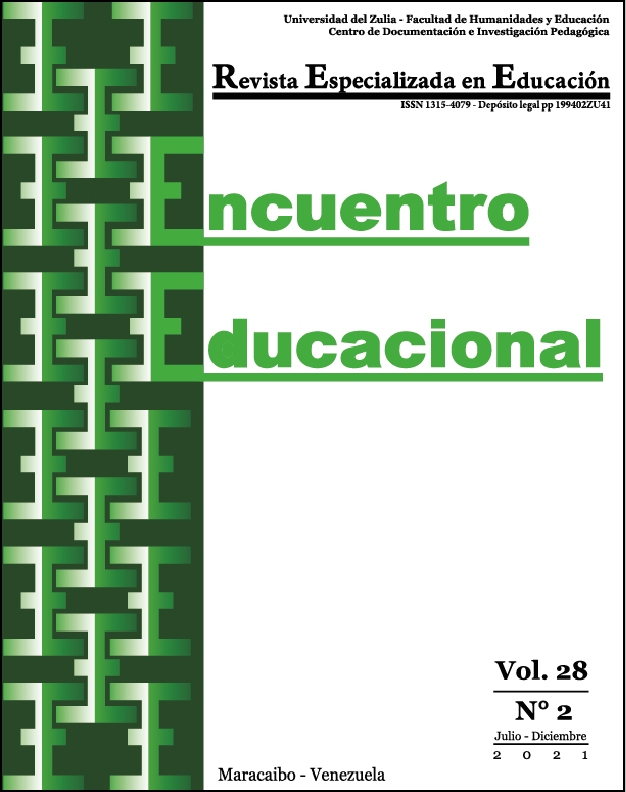Strategies for meaningful learning in derivatives of functions of one variable
Abstract
The work and understanding of the definition of the derivative is one of the fundamental elements for the academic process of engineering careers, for which it is relevant to understand and apply its approach from the algebraic and graphical perspective, both in exercises and in problems contextualized. The objective of the study was to determine the strategies for meaningful learning in derivatives of functions of one variable in the Faculty of Engineering of the Popular University of Cesar. It was based on the contributions of Manjarrez (2019), Romero (2019), Díaz and Hernández (2010), Ausubel (1986), among others. The method used for the research corresponds to the positivist paradigm, quantitative approach, descriptive type. The sample consisted of 6 teachers and 64 students of the Differential Calculus subject. A questionnaire with 33 questions was applied for the teachers and an adaptation for the students; these were processed through descriptive statistics. As a conclusion, it stands out that the most used strategies were the pre-instructional type and the least used the co-instructional ones. The most applied by teachers and students was knowing the objectives. The least used by teachers, previous organizers and by students, problem solving. It is recommended for future research to assess the use of other co-instructional strategies with mixed environments, to enhance the different strengths of learners from the educational field, even more so in this context.
Downloads
References
Ausubel, David. (1986). Aprendizaje significativo. Editorial Trillas, México.
Centro de Admisiones Registro y Control Académico (CARCA). (2019). Informe de CARCA. Universidad Popular del Cesar (UPC). Valledupar, Colombia.
Centro de Admisiones y Permanencia (CADPUIS). (2019). Informe de CADPUIS. Universidad Industrial de Santander UIS. Bucaramanga, Colombia.
Colina, Pedro y Romero, Yaritza. (2020). Una tipología general de errores matemáticos para los estudiantes de ingeniería. Revista Encuentro Educacional. Vol. 27, No 2, pp. 201-219 Disponible en: https://produccioncientificaluz.org/index.php/encuentro/issue/view/3636. Recuperado 25 de mayo de 2021.
Departamento de Matemáticas y Estadísticas. (2019). Estadísticas del departamento servidor. Universidad Popular del Cesar, Valledupar, Colombia.
Díaz, Frida y Hernández, Gerardo. (2010). Estrategias docentes para un aprendizaje significativo. Tercera edición, McGraw Hill, México.
González, María. (2017). Estrategias para el aprendizaje colaborativo en la unidad curricular algebra lineal (Tesis doctoral). Universidad Rafael Belloso Chacín, Maracaibo, Venezuela.
Hernández, Roberto y Christian Mendoza. (2018). Metodología de la investigación: Las rutas cuantitativa, cualitativa y mixta. Segunda edición, Editorial: McGraw Hill, México.
Manjarrez, César. (2019). Modelo instruccional bajo la modalidad mixta para el aprendizaje significativo de la derivada de funciones de una variable (Tesis de maestría). Universidad del Zulia, Maracaibo, Venezuela.
Manjarrez, César. (2016). Gestión del conocimiento para las competencias gerenciales en instituciones educativas técnico industrial de Colombia (Tesis de Maestría). Universidad Rafael Belloso Chacín, Maracaibo, Venezuela.
Mindiola, Dariana. (2016). Estrategias docentes para la construcción del conocimiento en el abordaje de la matemática en el programa de Ingeniería UNERMB (Tesis doctoral). Universidad Rafael Belloso Chacín, Maracaibo, Venezuela.
Moreira, Marco. (2012). Organizadores previos y aprendizaje significativo. Revista Chilena de Educación Científica. Vol. 7, No 2, pp. 23-30. Chile. Disponible en: http://www.if.ufrgs.br/~moreira/ORGANIZADORESesp.pdf. Recuperado el 21 abril de 2021.
Romero, Yaritza. (2019). Estrategias y condiciones para promover el aprendizaje significativo de las aplicaciones de la derivada en la ingeniería. REDHECS. Revista electrónica de Humanidades, Educación y Comunicación Social. Vol. 26, No 1, pp. 96-121. Maracaibo. Venezuela. Disponible en: http://ojs.urbe.edu/index.php/redhecs/issue/view/274. Recuperado 27 de marzo de 2021.
Romero, Yaritza. (2015). Modelo didáctico bajo la modalidad b-learning, en la promoción del aprendizaje significativo en las aplicaciones de la derivada (Tesis doctoral). Universidad Rafael Belloso Chacín, Maracaibo, Venezuela.
Romero, Yaritza y Jiménez, Luz. (2014). Análisis del rendimiento de los estudiantes de Cálculo I de las facultades de Ingeniería en universidades venezolanas. Memorias arbitradas VII Jornada Nacional y IV Jornada Internacional de Investigación, 27 al 30 de noviembre de 2013, Universidad Rafael Belloso Chacín, Maracaibo, Venezuela, pp. 781-789. Disponible en: http://www11.urbe.edu/jni/jornadasfinal.pdf. Recuperado el 15 de abril de 2020.
Vygotsky, Lev. (2014). Pensamiento y lenguaje. Tercera edición, Editorial Pueblo y Educación, Cuba.
Vygotsky, Lev. (2007). Pensamiento y habla. Traducción de: Alejandro Ariel González. Primera edición, Editorial Colihue, Argentina.
Zenteno, Flaviano. (2017). Método de resolución de problemas y rendimiento académico en lógica matemática. Revista Opción. Vol. 33, N° 84, pp. 440-470. Disponible en: https://www.redalyc.org/pdf/310/31054991016.pdf. Recuperado el 08 de mayo de 2021.


















